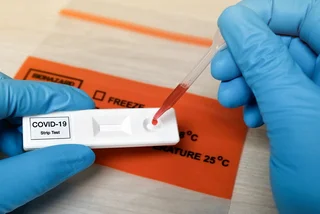We have all been watching the news each day, following the current PES level and deciding how to regulate our lives according to this mystical number announced by the government, seemingly at every hour. But with this latest announcement, everything is about to change – again.
Until now, the PES risk index has not taken into account the newly-pushed antigen testing, as the state officially only recognizes PCR test results in the risk assessment calculation. With the massive onset of antigen testing in social facilities and planned widespread pre-Christmas testing, this is about to change. The state is to start publishing the results of these new tests and will adjust the PES methodology accordingly.
Two different variants of the PES system will now be calculated: one with PCR results as before, and one with the new antigen test results. Disregarding negative antigen tests in the past has led to an increase in the number of positive results, which has an effect on the overall value of the PES level, so now there will be two assessments.
"Currently, the PES level is based on PCR tests. Antigen tests have not yet been equated with PCR tests, so we were in slightly different diagnostic territory. Only positive antigen tests [thus far] are being counted," Ladislav Dušek, director of the Institute of Health Information and Statistics (ÚZIS), told Novinka today.
However, according to Dušek, a change is expected in the near future, as the European Center for Disease Control and Prevention (ECDC) will issue a plan for antigen testing. "This will put them on a completely different level (compared to PCR-only tests) and at the same time it will be a challenge to take them into account," he explained.
As soon as this happens, according to Dušek, the Ministry of Health is prepared to start publishing the results of the antigen tests in addition to PCR tests. Due to this, it will also be necessary to change the PES methodology so that antigen tests are reflected in the PES level, and in the overall national situation.
"We will have to start publishing it and we will have to explain it properly. This is necessary in order to increase people's interest in antigen testing. We can't hide antigen tests somewhere behind a curtain and not talk about them," Dušek added.
Dušek said that according to Minister of Health Jan Blatný (ANO), a significant change in the calculation could occur in less than a month. It is not yet clear exactly what this will look like by that time and which data PES will follow.
The PES risk index jumped to 64 at the weekend after a number of days when the level remained at three. However, this corresponds to the fourth PES level, which specifies a tightening of restrictions, including the closing of shops, services and restaurants. The level is mainly influenced by two factors – the growing reproduction (R) number, which now remains above one, and also the share of positive tests in relation to the number of tests performed.
In recent weeks, antigen tests have been widely rolled-out in social facilities, especially in nursing homes, where relatively high numbers of infections have been detected, which is reflected in national statistics.
According to the current methodology, only those antigen tests that are positive and subsequently confirmed by PCR tests are reflected in the PES index – negative tests thus far have remained uncounted, which would statistically reduce the total volume of tests from which the ratio of positive tests are calculated.












 Reading time: 3 minutes
Reading time: 3 minutes 




























